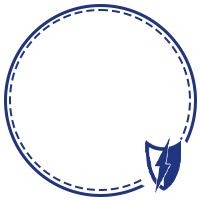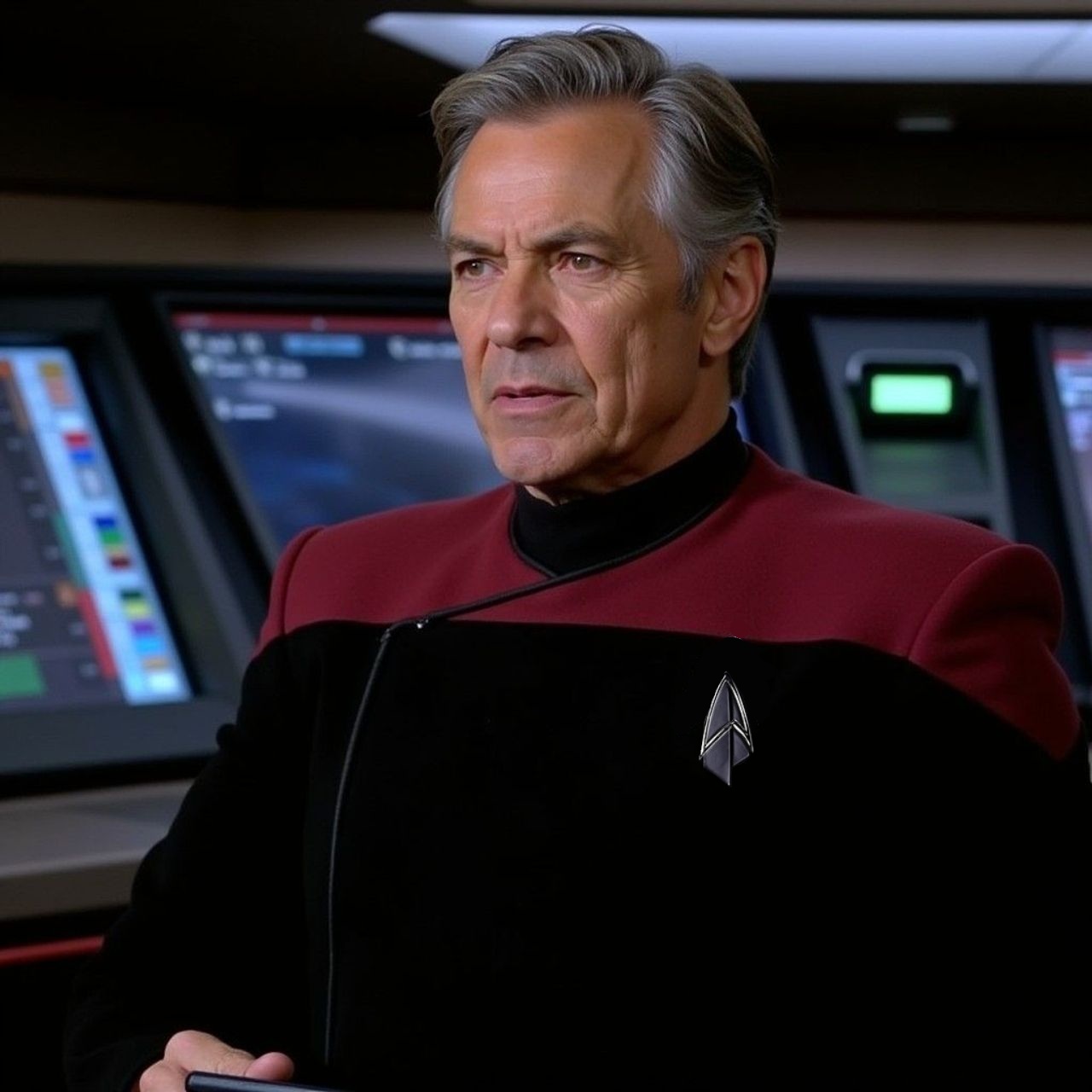The more her field of vision narrowed on the chronometer, the more Yuulik felt like she was drowning. Her chest felt tighter with every tick of the second counter climbing higher and higher. She knew the sensation to be unnatural, imaginary. She was standing in the astrophysics lab, and the life support systems were fully functional. There was no reason to feel this way. As the saying goes, there had to be something wrong with the universe.
A time pressure was as welcoming as a warm bath to Yuulik. It offered clarity of purpose and energised her so. If anything, she was less productive without an impending deadline of deadly proportions. The synapses didn’t spark as quickly. This was supposed to be her element, her time to shine. And yet, this time was different.
What was painful, exactly, was a deadline on which she was dependent on others. Being dependent on the ingenuity of the science team—with their differing specialties, personalities, and the combination of Starfleet and Romulan Free State personnel—was torture. That was a cold plunge in the middle of a nap.
Captain Taes had called for a science department slumber party. Nobody was sleeping until they solved the mystery of the Cardassian deep-space tetryon platform. Yuulik had identified an emitter dish on the platform, which meant the Cardassians could collapse the local Underspace aperture with a concentrated beam of tetryons. If the cruiser Vorkel attempted any interference with the aperture before the starships Almagest and Grus returned to Federation space, Taes needed a method to delay the Cardassians without resorting to armed conflict.
Yuulik had publicly grimaced and groaned at the juvenile suggestion of a slumber party. Still, her objections quickly evaporated as science officers gathered in their comfortable training uniforms. If anything, Yuulik was overcome by nostalgia, when Taes joined in on the free-form research and brainstorming. It almost felt like those honeyed days aboard the archaeology and anthropology ship Dvorak. Except Yuulik hadn’t been the science chief then, and she hadn’t always noticed just how slowly and distractedly her colleagues worked through problems.
Reaching for a forgotten brainstorm on a holographic LCARS projection, Yuulik quickly scanned her team’s list of half-formed ideas. From inverse tachyon spumes to probe-generated antitachyon field, Yuulik aggressively crossed out ideas, saying “bad, bad, bad, bad.” She didn’t cross out the beta-tachyon web, though.
All too abruptly, Yuulik could feel Captain Taes’s eyes on her. She couldn’t anticipate what judgment Taes would place on her. It wasn’t as if Yuulik was shouting at or scolding any team members, but even dismissal was too harsh in Taes’s assessment sometimes. Rather than examining this assumption further or seeking clarity from Taes, Yuulik evaded the self-doubt. She hurried into the department head office, where the Romulans were gathered in a clique. It was the first time Yuulik had seen some of them in casual clothing rather than their utility jumpsuits. For a moment, she wondered why it mattered to any of them to play into Taes’s whims and whimsy.
“You are absolutely correct, Yuulik,” Flavia said in greeting. She waggled a finger at the holographic display where Yuulik had crossed out half of the ideas. “None of those ideas were going to be triumphant.”
Yuulik tentatively muttered, “Uh, thank you.” She was always skeptical when Flavia showed her kindness—perhaps less so since Flavia had saved her life from Addie’s schemes. Yuulik also noticed that all of Flavia’s team’s brainstorming was written in Romulan script, keeping it obscure until Flavia chose to share it herself.
“Science trickery is too obvious,” Flavia clarified. “It’s the automatic lazy crutch of the Federation. When you don’t know how to escape the holes you’ve dug for yourself, you douse it in radiation or pulses.”
Yuulik smiled sweetly when she asked, “Our harmonic coupling with the Kazon deflectors served us very well, didn’t it?”
Flavia narrowed her eyes on Yuulik. “And how exactly did you achieve that? I studied the logs of your maneuver, but it resembles no research I’ve ever read, not even on the fringe of theory.”
Seating herself on a stool just outside the office, Yuulik stared back at Flavia, and she shrugged. After Frontier Day, Flavia and her team had been wary enough to return to Constellation. Aggressively mining the Borg memory fragments of her junior officers was a detail Yuulik was better off keeping to herself in an alien language that only she could read.
“I’ve always said,” Yuulik shot back, “you could afford to be better read.”
Flavia cleared her throat and said, “In the spirit of the Treaty of Bajor, there is little difference between firing on the Cardassian platform with an anti-tetryon beam rather than a phaser beam. I don’t imagine the rage of the Cardassians will be quelled by a technicality.”
“You’d be surprised how much Starfleet gets away with based on little more than technicalities,” Yuulik said, even though she knew Flavia was right. “So what would you do?”
Shaking her head slowly, the shine faded from Flavia’s eyes as she said, “You don’t conquer the Cardassians with technology. You manipulate their environment. We’re too far from the Kzinti border, but Laken is devising a gambit to lure a Breen interceptor to claim this aperture.
“Or Ketris recalls the captain of the Almagest, Elbon, from our assignment to USS Sarek. If we invented a story about Gul Khem murdering his parents in the uridium mines of Bajor, he could almost get away with destroying the platform as a justifiable target. We haven’t found the precise angle–“
“But his parents weren’t on Bajor during the occupation,” Yuulik interjected.
Flavia laughed. It was a shrill sound, falsetto and brittle.
“As if Bajorans keep reliable records,” Flavia remarked.
“You, uh…” Yuulik started to protest, but the chronometer was still ticking on another display in her field of vision. She couldn’t afford to ignore any angles, not when the Cardassians could complete the platform at any moment.
Finally, Yuulik said, “You keep working on that.” She rose from the stool and ran off before Flavia could try to get in a last word. Across the lab, Yuulik spotted a gathering of giggling junior officers sitting under the curved display wall. Nune was lying on his side, listening intently to the others; Dolan was sitting on his knees, wearing a research helmet; T’Kaal was seated in a meditative pose, speaking to the others with deep sincerity despite the others’ cackling reactions.
Before Yuulik could march into their midst, Taes grabbed Yuulik by the arm and dragged her into the analysis chamber. Taes closed the transparent door, keeping the content of their discussion private, even if everyone could see them.
“Don’t,” Taes insisted.
“But I didn’t do anything,” Yuulik rebutted.
“No,” Taes said again, “Don’t. Take a breath. Let them think it through.”
Yuulik glared at the junior officers through the transparent panels before returning to Taes.
“That’s a puzzle game on Dolan’s face plate,” Yuulik said. “I don’t see how that will tell them anything about tachyon flows.”
“Willpower is not a limitless resource,” Taes said. “You have to let them find their way, sometimes. I know it’s not easy. I’ve heard from the USS Caliburn. Their analysis reached the same conclusion: the emitter dish on the platform could close an aperture, and enough of them could collapse the entire Underspace network. Worse, there are more of these large Cardassian platforms. Waiting for the right solution demands a lot of patience from you. I recognise that. But that’s also what the third pip is for.”
Yuulik shook her head. “You might not have to be patient much longer, captain.”
Taes grimaced. “Tell me.”
“I have a bad idea,” Yuulik told her. “A very bad idea. I can’t go rogue this time. In fact, I need you to implement this very bad idea yourself. You and Captain Elbon.”

 Bravo Fleet
Bravo Fleet










